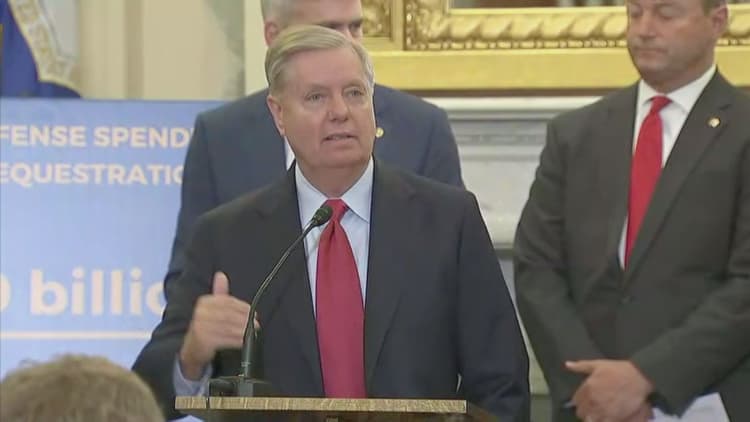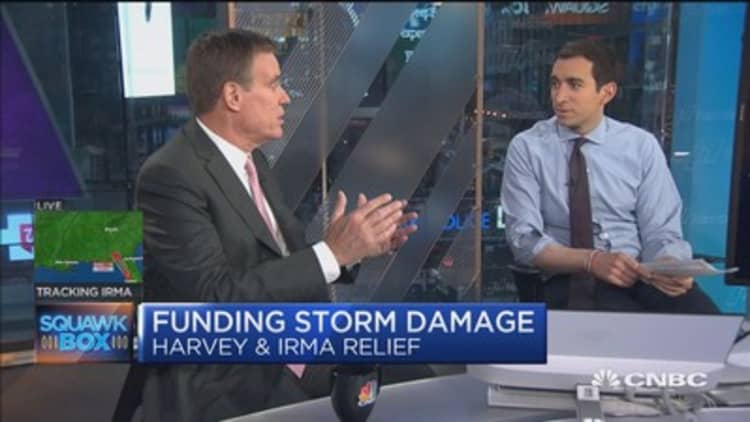The Congressional Budget Office on Monday said it will not estimate how a new Obamacare bill will affect the number of uninsured Americans, insurance premiums and ultimately the federal deficit in coming years until after the Sept. 30 deadline for passing that legislation.
The announcement means that supporters of the Graham-Cassidy bill will not have to deal with dire CBO predictions about its effects, which have helped doom prior Obamacare replacement efforts.
The CBO said Monday it "is aiming to provide a preliminary assessment of the Graham-Cassidy bill by early next week."
"CBO will provide as much qualitative information as possible about the effects of the legislation," the agency said.
That will include a projection of whether Graham-Cassidy will reduce the federal budget deficit by at least the $119 billion projected by the CBO for a prior Obamacare repeal bill.
"However CBO will not be able to provide point estimates of the effects on the deficit, health insurance coverage, or premiums for at least several weeks."
The term "point estimates" refers to a specific dollar amount that CBO will eventually project that the deficit will decrease by as a result of the bill becoming law.
The announcement came hours after top Democratic congressional leaders formally asked the CBO to issue a full analysis of Graham-Cassidy.
"A comprehensive CBO analysis is essential before Republicans force a hasty, dangerous vote on what is an extreme and destructive repeal bill," a letter from those Democratic leaders said.
"Members of Congress and the American people need to know the full consequences of Graham-Cassidy before any vote."

Despite the lack of a CBO score before the Sept. 30 deadline, Graham-Cassidy is expected to lead to large increases in the number of uninsured Americans because of similarities between the bill and past GOP repeal efforts that have been analyzed by CBO.
The Senate does not normally have a deadline to pass legislation. But in early September, the Senate parliamentarian ruled that the authorization to repeal Obamacare through the special procedure known as reconciliation expires on Sept. 30.
If they don't meet that deadline, Republicans would have to approve a new budget resolution, which can trigger reconciliation.
Because they are using budget reconciliation to expedite passage of the bill, the GOP needs only least 50 senators to vote for the bill, instead of a filibuster-proof 60 votes. Republicans have just 52 Senate seats, and no Democrats or independents are expected to vote for the bill.
If passed, the bill would then have to be considered by the House of Representatives.
Senate Minority Leader Chuck Schumer of New York said Monday that he and his fellow Democrats would "explore every single option" to defeat Graham-Cassidy.
The Protect Our Care Campaign, a leading Obamacare-defense group, on Monday criticized Republicans for continuing to push for repeal of the Affordable Care Act.
The group also blasted the GOP for scheduling on a hearing on the new bill before the Senate Homeland Security and Governmental Affairs Committee, instead of before committees with oversight over health issues.
"This single hearing, in a unrelated committee, focusing on one aspect of the health care system which represents one-sixth of the American economy, will be chaired by Senator Ron Johnson, who previously criticized secretive repeal and complained that the vote was being rushed before advocating for bipartisanship, telling CNN, 'I wish we were doing this this on a bipartisan process,' " Protect Our Care Campaign said. "While this hearing is being spun as regular order by Republicans, nothing could be further from the truth."
Protect Our Care Campaign Director Brad Woodhouse said, "At a time when we don't have a Secretary of Homeland Security, when our allies are dealing with domestic terrorism, where the threat to our homeland from North Korean missiles is growing daily, when the committee has yet to discuss disaster relief, the idea that this is how Chairman Johnson is using his gavel is appalling."
"As Senator [John] McCain calls for regular order, his caucus continues to do the opposite," Woodhouse said. "This 'hearing' is a joke and a sham and is part of a cynical and and dishonest process to ram through the repeal of health care on a party line vote. It's wrong and the American people won't stand for it."
WATCH: Sen. Warner says Dems should have worked with GOP on health care



